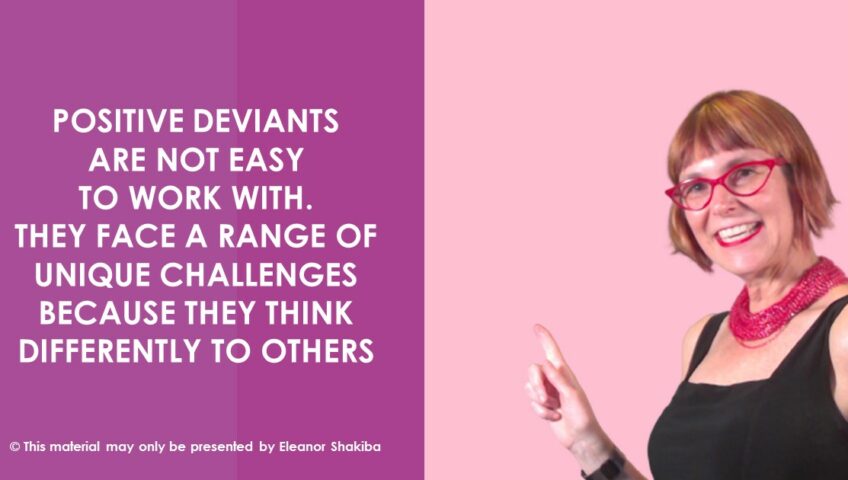In 2018 I made a significant shift in my coaching practice. I started saying “no” to remedial coaching. Why? Remedial coaching aims to address behavioural or mindset problems. It is tough work and involves working with resistant or outright hostile clients. These are people with ‘sendee syndrome’ as facilitators say. Often, coaching is a final step in a disciplinary process for these employees. They aren’t committed to change and just want to go through the motions of turning up because ‘HR said so’.
The early part of my career was dedicated to training and coaching in conflict resolution. So working with this type of client was normal for me. However, specialising in this area meant I was often exposed to negative or hostile people, who didn’t really want to learn. Deciding to shift the focus of my business meant turning towards a more inspiring and proactive type of client. Indeed, I soon realised that my ideal client is the exact opposite of a negative deviant – it’s a so-called ‘positive deviant’ and high achieving professional. In particular, I thrive when coaching ambitious, experienced and high achieving people who think in quirky ways. These tend to be the glass ceiling breakers and the knowledge workers in our organisations.
Positive deviants are not easy to work with. They face a range of unique challenges because they think differently to others within their organisations. This can mean they face unique challenges in relation to communicating their ideas and getting others onside. As naturally curious and innovative thinkers, though, these people are always a pleasure to work with. What do I like specifically about working with positive deviants?
Positive deviants are naturally goal oriented
Drive and determination bring out the best in coaching clients. Because positive deviants tend to have ambitious and significant goals, they are fascinating to work with. Many positive deviants see themselves as mavericks. This means when they find a coach who understands their way of thinking, they naturally become highly motivated coaching clients.
They see solutions where others see problems
The most interesting thing about positive deviants is they tend to not even notice problems. Their curiosity mindsets focus their attention on the intrigue of overcoming challenges. This means they step naturally into the solution focused mode of thinking. The result is a fast paced, creative and dynamic approach to getting results. An ideal client for me, because I love working with results-oriented people.
Many positive deviants crave robust feedback
As people who excel, positive deviants are often overlooked by their leaders. Less experienced leaders often focus on performance problems, rather than seeing the benefits of creating stretch goals and giving feedback to positive deviants. This means that positive deviants thrive in the coaching environment, especially when they have a coach who is willing to point out thinking patterns or behaviours which are slowing down success.
Focusing on positive deviants allows organisations to accelerate change
After all, it is the positive deviants who do things differently. They naturally step into the zone of excellence. This means their efforts tend to have significant impact on both team and organisational outcomes. The rewards of working with people who create ripple effects of positivity are numerous. This is why I would rather have fewer clients, but positively deviant clients, in my coaching business these days.
To find out more about bringing out the best in positive deviants, download Eleanor Shakiba’s free e-book. The Positive Psychology Toolkit for HR and L&D Practitioners is a great resource for any trainer or facilitator who is eager to find out more about positive psychology.
About the author: Eleanor Shakiba
Eleanor is a trainer and coach, with a passion for unleashing the power of positive deviance in talented people. She has taught more than 50,000 people how to excel professionally. An expert in the field of Positive Psychology, Eleanor is also qualified in Social Anthropology, Counselling, Coaching, Adult Education and Neuro Linguistic Programming. She specialises in helping HR and L&D practitioners to unleash the power of positive psychology in business. Her major focus in developing three key areas that support positive workplace cultures: positive mindset, proactive communication and purposeful leadership. Eleanor is the author of the Positive Psychology Toolkit for HR and L&D Practitioners. Download your free copy here.
